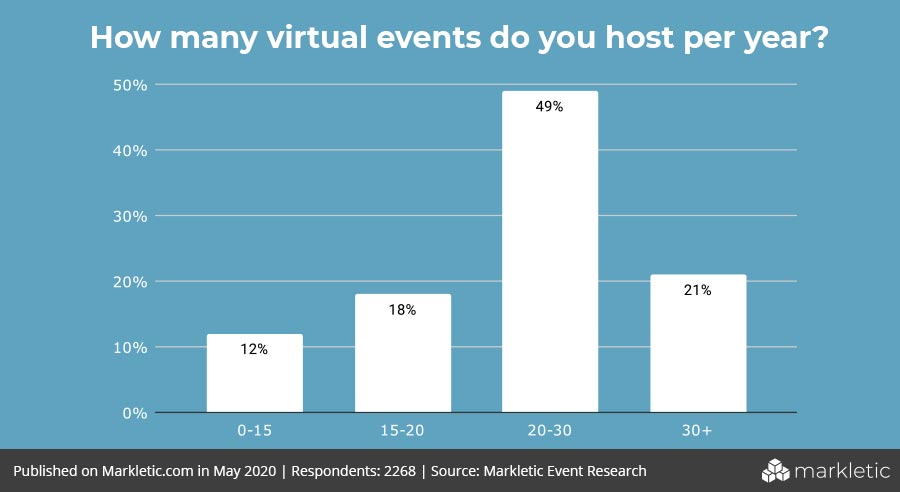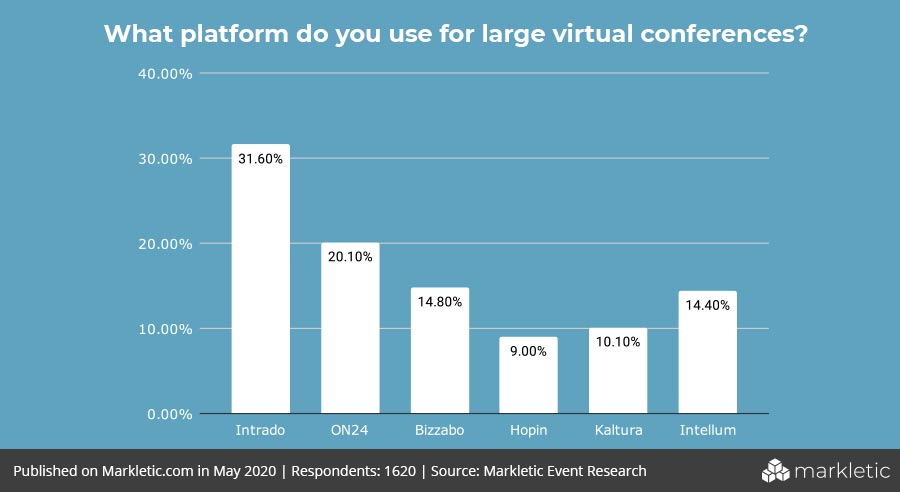8 Tips to Perfect your Virtual Event Marketing Plan

Table of Contents
Having a solid virtual event marketing plan is key to the success of your events. With the right marketing plan, you will do the right things throughout the event journey and create buy-in from your important stakeholders.
This year has been tough in the event industry. Many events had to be canceled or postponed due to the coronavirus. If you are in Field Marketing like me, you definitely would have seen the impact on your business.
Situations like this mean that you need to innovate and come up with new ideas. This year, virtual events kicked-off and so far we’ve done over 20 this year.
49% of B2B marketers will host more than 20 virtual events this year.

With this quantity of virtual events, it’s absolutely key to have a solid virtual event marketing plan. Not only will your events be more successful, but you will also make sure that the follow-up process is most effective.
When hosting 20+ virtual events per year, it’s easy to keep hopping to the next events and never look back at the performance of your past events.
The follow-up stage is the most important stage of your virtual events though. You can host perfect virtual events but if your sales aren’t following up, the events won’t result in new business.
So, I’m here to share best practices to perfect your virtual event marketing plan.
1. Prepare your content for small virtual events before scheduling the event date
This tip comes from learning by trial and error. It happened too many times to me that we set an event date, created buy-in from everyone, and then the event content wasn’t ready on time.
The result is that your promotion period will be too short and that it will be hard for you to fill the event with relevant people.
The average promotional period lasts 3.5 weeks (Markletic, 2020). So, if the content is delayed and you only have 2 weeks to promote your virtual event, you are going to run into issues.
In your small virtual event marketing plan, you should really indicate that the promotion period will start when the content is all done. What content am I talking about?
- Landing pages;
- Marketing Automation logic;
- Event theme and discussion points;
- Promotional emails;
- Sales kits.
When this content is all done, go back to your stakeholders, and schedule a date for your small virtual event. This results in your not having to postpone virtual events and lose credibility with your stakeholders.

2. Plan to keep your audience engaged
49% of marketers say that audience engagement is the biggest contributing factor to having a successful event. (Markletic, 2020)
The fact is that it’s easier to keep people engaged at an in-person event. With virtual events, there can be many distractions. The last thing you want to do is to run a virtual event that is “death-by-powerpoint”.
With virtual events it is trickier to keep your audience engaged. So, always include audience engagement in your virtual event marketing plan.
Definitely include basic things such as in-event polling to get the feedback of your audience related to certain topics.
If you are hosting a large virtual event, the sky's the limit. You can have virtual environments where you hire magicians to do tricks to keep people engaged while waiting for the next session.
For smaller events, consider hiring a sketch artist that draws meeting notes.
You want people to remember your virtual event, that’s how you are going to make an impact on your audience.
I’ve written a separate article about 5 Creative Virtual Event Audience Engagement Ideas. Check it out for more ideas on audience engagement.
3. Select the right hosting platform
Sometimes, selecting a hosting platform for your virtual events is a no-brainer. If you are hosting small virtual events of let’s say 10-20 people, you can use your video conferencing tool for this.
Common options are Zoom, Microsoft Teams, or Google Meet. If you want to use Zoom, I’ve written a guide on how to use Zoom for virtual roundtable sessions.
But let’s say you are hosting a large virtual conference and you are expecting more than 1000 people attending your event. Which hosting platform is most suitable for you?
That’s a question that is trickier to answer because it really depends on your event goal. Do you want event sponsors to have a virtual booth? Do you want sessions to be pre-recorded or are you going to host live sessions? How user-friendly is the platform?
These are questions you need to answer and include them in your virtual event marketing plan.
We have done some research on large virtual event platforms and below are the results. This should help you to get an idea of the leading platforms for large events.

4. Create a digital marketing plan to support your virtual event
I’m a strong believer in a multi-channel marketing plan. The best events that I ever hosted, generating more than $5 million in sales pipeline, had a very strong digital marketing strategy supporting the event.
Whether it’s in-person or online events, you need a digital marketing plan for your events.
Your digital marketing plan needs to take into consideration your virtual event timeline. For each event, you have to deal with the following phases:
- Before the end;
- During the event;
- After the event.
For smaller virtual events, your digital marketing efforts will focus mostly on before the event activities; with the goal to drive awareness and registrations.
In addition, after the event, you can use the event recordings to promote newer sessions and to ensure you maximize account penetration. As you know, B2B buyers don’t make the decision alone. You need to influence the full buying team.
With larger virtual events, you need to have a digital marketing plan that supports during the event audience engagement. At large virtual events, you have an excellent opportunity to maximize social media awareness.
Through your virtual event marketing timeline, you should include digital campaigns. I’ve written an article about the best digital marketing marketing strategies for B2B events if you want to learn about more strategies.

5. Create buy-in for your event promotion strategy
This is especially relevant for small virtual events. With small virtual events, you are often targeting decision-makers and C-level people.
The truth is that marketing campaigns will have little effect on these personas. These people really need to be contacted personally by either your sales teams or VPs.
Without the commitment of your sales team, you will have a hard time filling the event with the audience that you are after.
Therefore, it’s incredibly important to get the buy-in from your sales team and include them in all the decisions you make.
You should be making your virtual event marketing plan together with sales. That way, it’s not just a marketing event, but also a sales event.
If your sales are committed to making the event work then you:
- Will get the right level of people at the event;
- You will hit your registrations target;
- Don’t need to postpone your event to a later date.
Check out these virtual event promotion strategies.
6. Create an event dashboard before the event date
In every virtual event marketing plan, you need to include reporting. How are you going to keep track of your virtual events if you do 20+ of them in a year?
The answer is a proper event dashboard. For each type of virtual event, you need to create a dashboard.
If management asks you to reflect on your marketing investment, you need to give them an answer straight away.
So, on every dashboard, you need to include:
- The leads generated (from your named accounts)
- MQLs generated
- Opportunities created
- Won business generated
Most B2B companies use software such as Salesforce. I always advise creating dashboards in your CRM. This way, everyone has access to it, including your sales team.
If you have Salesforce, and you’re curious about how to create an event dashboard on it, you’re in luck.
I’ve created an article about how to create an event dashboard on Salesforce. Check it out for some best practices.
7. Co-host the event with a partner
You are doing yourself a favor to include partners in your virtual event marketing plan.
Co-hosting events with a partner has a couple of benefits:
- You share audience generation responsibilities;
- They can act as an expert which provides more value to your audience;
- You can split the costs.
Of course, you will also benefit from their brand awareness. Moreover, you will train the partner to host similar events themselves in the future.
You can package up your virtual event and present it to your partner as a “virtual event in a box”.
This way, they can take the concept and replicate it. This creates scalability.
8. Take your audience through a journey
Saving the best for last!
Audience engagement is so important. It’s what differentiates you from the competition.
You need to provide a unique experience for your audience. Not just during the event, but throughout the event journey.
This is not easy and that’s why it’s something you should include in your virtual event marketing plan. It takes effort and requires the buy-in from stakeholders.
However, if you pull it off, your audience will experience something different than when they attend other online events.
Taking your audience through a journey starts before the event. Make sure that the journey is consistent before, during, and after the event.
A company that is great at this is Tomorrowland, the festival in Belgium. They take their audience through a journey and it starts well before the actual event.
They rent and decorate airplanes that take their audience to the event. A great and unique experience! They also send the bracelets to access the event in a unique box that is themed according to the festival.

Engagement starts before the event. Engage them before the event, during, and post-event. This is when you can wow them and how you are going to make a difference.
Excited to set up your virtual events? Well, continue by reading this guide on how to set up virtual events effectively.
Extra Resource: 6 Benefits to sponsoring virtual events
Share this article



